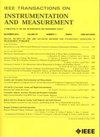A Strategy for State of Charge Estimation of Lithium-Ion Battery via an Adaptive Cubature Kalman Filter Based on Fractional-Order Model
IF 5.6
2区 工程技术
Q1 ENGINEERING, ELECTRICAL & ELECTRONIC
IEEE Transactions on Instrumentation and Measurement
Pub Date : 2025-06-18
DOI:10.1109/TIM.2025.3580841
引用次数: 0
Abstract
Accurate state of charge (SOC) estimation of lithium-ion battery (LIB) is beneficial for battery management systems (BMS) to optimize the management of LIB, which has significant implications for the operation of electric vehicles. In this article, SOC estimation of LIB is achieved via an adaptive cubature Kalman filter (ACKF) based on the fractional-order model (FOM), where FOM consists of one parallel resistance-constant phase pairs and one Warburg unit (FO-RCW). The parameters and orders in FO-RCW model are identified via multiswarm cooperative particle swarm optimizer (MCPSO) based on the experimental data. The sigmoid function is employed to address potential boundary exceedance issue of SOC and order. The parameters and orders of the LIB model are operation-dependent, varying under different working conditions, therefore, the augmented vector method is adopted, integrating the identified model parameters and orders (as initial value), and SOC into a augmented state vector. Subsequently, an ACKF based on the FO-RCW model is proposed to achieve SOC estimation and online parameter and order estimation. Finally, the effectiveness and superiority of ACKF based on FO-RCW model are validated via experiments.基于分数阶模型的锂离子电池荷电状态估计策略
准确的锂离子电池荷电状态(SOC)估算有助于电池管理系统(BMS)对锂离子电池进行优化管理,对电动汽车的运行具有重要意义。在本文中,LIB的SOC估计是通过基于分数阶模型(FOM)的自适应培养卡尔曼滤波器(ACKF)实现的,其中FOM由一个并联电阻常数相对和一个Warburg单元(FO-RCW)组成。基于实验数据,利用多群协同粒子群优化器(MCPSO)对FO-RCW模型的参数和阶数进行了辨识。采用s型函数来解决SOC和有序的潜在边界超越问题。LIB模型的参数和阶数与操作相关,在不同工况下会发生变化,因此采用增广向量法,将识别出的模型参数和阶数(作为初始值)与SOC整合为一个增广状态向量。随后,提出了一种基于FO-RCW模型的ACKF,实现了SOC估计和在线参数阶数估计。最后,通过实验验证了基于FO-RCW模型的ACKF的有效性和优越性。
本文章由计算机程序翻译,如有差异,请以英文原文为准。
求助全文
约1分钟内获得全文
求助全文
来源期刊

IEEE Transactions on Instrumentation and Measurement
工程技术-工程:电子与电气
CiteScore
9.00
自引率
23.20%
发文量
1294
审稿时长
3.9 months
期刊介绍:
Papers are sought that address innovative solutions to the development and use of electrical and electronic instruments and equipment to measure, monitor and/or record physical phenomena for the purpose of advancing measurement science, methods, functionality and applications. The scope of these papers may encompass: (1) theory, methodology, and practice of measurement; (2) design, development and evaluation of instrumentation and measurement systems and components used in generating, acquiring, conditioning and processing signals; (3) analysis, representation, display, and preservation of the information obtained from a set of measurements; and (4) scientific and technical support to establishment and maintenance of technical standards in the field of Instrumentation and Measurement.
 求助内容:
求助内容: 应助结果提醒方式:
应助结果提醒方式:


